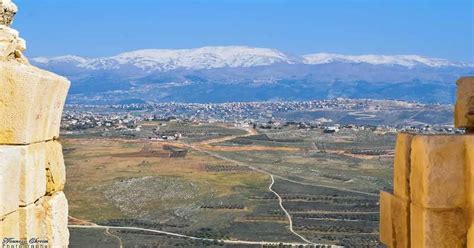Nabatieh, a picturesque city in southern Lebanon, is known for its rich history, cultural landmarks, and scenic landscapes. Nestled in a region steeped in historical significance and natural beauty, Nabatieh offers visitors a variety of attractions that reflect its heritage and vibrant community. Among the best places to visit in Nabatieh are the historical town of Nabatieh itself, the ancient Roman ruins of Qana, the impressive Nabatieh Mosque, and the lush surroundings of the local gardens and parks. Each of these sites provides a unique perspective on the city’s past and present, making Nabatieh a compelling destination for travelers exploring southern Lebanon.
Nabatieh Town
Nabatieh Town, the heart of the city, is a charming area that blends historical significance with modern vibrancy. Visitors can explore the traditional architecture, bustling markets, and local cafes that characterize this lively urban center. The town’s streets are lined with shops selling local goods, from handicrafts to fresh produce, offering an authentic glimpse into everyday life. Nabatieh Town also hosts various cultural events and festivals throughout the year, showcasing the rich traditions and community spirit of the area. Wandering through the town provides a sense of its historical depth and contemporary dynamism.

Roman Ruins of Qana
The ancient Roman ruins of Qana, located near Nabatieh, are a remarkable archaeological site that highlights the area’s historical importance. Known for its well-preserved structures, including a theater, baths, and mosaic floors, Qana offers a fascinating insight into Roman life in the region. Visitors can explore the ruins and learn about the historical significance of the site through informative displays and guided tours. The ancient ruins of Qana are a testament to the rich cultural heritage of the region and provide a unique opportunity to connect with the distant past.
Nabatieh Mosque
The Nabatieh Mosque is a prominent religious and architectural landmark in the city. Known for its elegant design and serene atmosphere, the mosque serves as a central place of worship for the local Muslim community. Visitors can admire the mosque’s architectural features, including its minarets and decorative elements, and experience the peaceful ambiance of the prayer halls. The Nabatieh Mosque is not only a place of spiritual significance but also an important cultural landmark that reflects the city’s religious and architectural heritage.
Local Gardens and Parks
Nabatieh’s local gardens and parks offer a refreshing escape into nature, providing beautiful green spaces for relaxation and recreation. The city’s parks feature lush greenery, walking paths, and picnic areas, making them ideal spots for families and nature lovers. Visitors can enjoy leisurely strolls, outdoor activities, and picturesque views of the surrounding landscape. These green spaces highlight Nabatieh’s commitment to preserving natural beauty and providing enjoyable recreational areas for residents and visitors alike.
Nabatieh Historical Museum
The Nabatieh Historical Museum is a valuable cultural institution that showcases the region’s rich history and heritage. The museum’s exhibits include artifacts, historical documents, and traditional crafts that provide insights into the local culture and historical developments. Visitors can explore the various displays, learn about the city’s past, and gain a deeper understanding of its historical significance. The Nabatieh Historical Museum is an essential destination for those interested in learning more about the area’s cultural and historical background.
Vote
Who is your all-time favorite president?
Al-Khiam Detention Camp
The Al-Khiam Detention Camp, located near Nabatieh, is a significant historical and political site. Established during the Lebanese Civil War, it served as a detention center for prisoners and has since become a symbol of the region’s turbulent past. Visitors can tour the camp and learn about its history, the experiences of those detained there, and the broader context of Lebanon’s political conflicts. The Al-Khiam Detention Camp provides a sobering reflection on the challenges faced by the region and offers insights into its complex history.
Nabatieh Souk
The Nabatieh Souk, or market, is a lively commercial area where visitors can experience the local culture and trade. The market features a variety of stalls selling everything from fresh produce and spices to clothing and handicrafts. Walking through the souk provides an opportunity to interact with local vendors, sample traditional foods, and immerse oneself in the bustling atmosphere of daily life. The Nabatieh Souk is a vibrant part of the city’s commercial and social fabric, offering a dynamic and authentic experience.
Nabatieh’s Religious Sites
In addition to the Nabatieh Mosque, the city is home to several other important religious sites. These include churches and shrines that reflect the diverse religious landscape of the region. Visitors can explore these sites, learn about their significance, and appreciate the architectural and cultural contributions they make to the city. Nabatieh’s religious sites are a testament to the city’s rich spiritual heritage and its role as a center of religious and cultural diversity.
Advertisement
The Qasr al-Msharfeh
The Qasr al-Msharfeh is an historic palace located on the outskirts of Nabatieh. This well-preserved structure offers a glimpse into the architectural style and historical significance of the region. Visitors can explore the palace’s elegant rooms and gardens, which reflect the opulence of past eras. The Qasr al-Msharfeh is an important cultural landmark that contributes to the understanding of Nabatieh’s historical and architectural heritage.
Summary
Nabatieh, with its blend of historical landmarks, cultural sites, and natural beauty, offers a diverse range of attractions for visitors. From the ancient Roman ruins of Qana and the serene Nabatieh Mosque to the lively Nabatieh Souk and the tranquil local gardens, the city presents a multifaceted experience. Exploring the Nabatieh Historical Museum, the Al-Khiam Detention Camp, and religious sites provides deeper insights into the region’s complex history and cultural diversity. The Qasr al-Msharfeh adds a touch of historical grandeur, rounding out the rich tapestry of Nabatieh’s offerings. Visiting Nabatieh is a journey into a city that embodies both its historical depth and contemporary vibrancy, providing a comprehensive understanding of its heritage and cultural landscape.